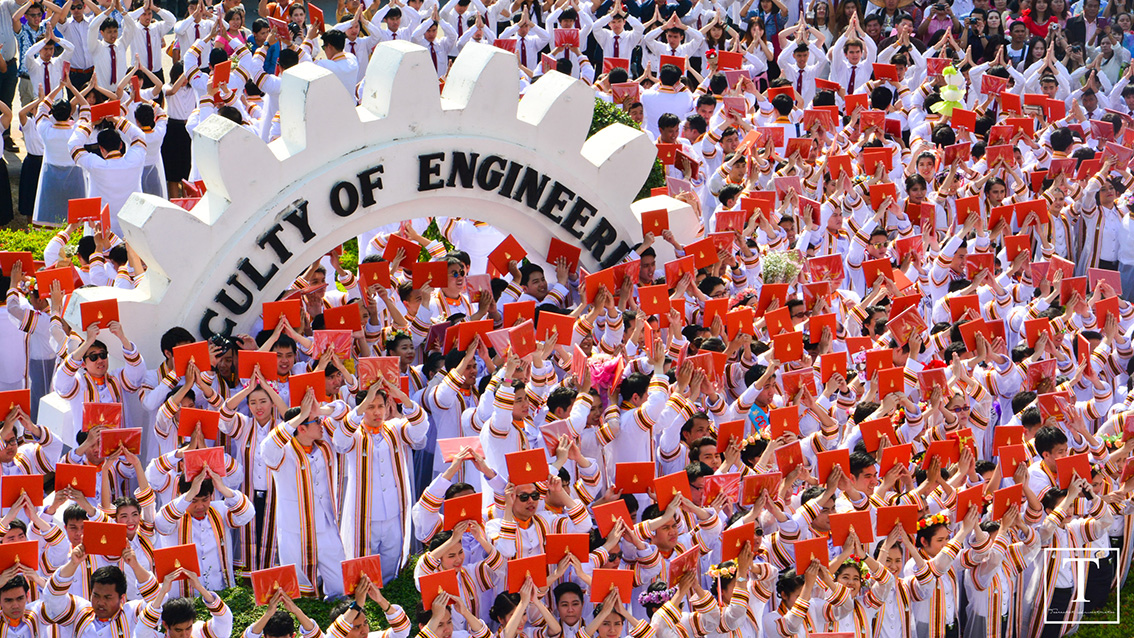Regular Programs
Bachelor’s Degree Programs
Civil Engineering Program
Program Educational Objective (PEOs) and Student Outcomes (SOs)
The course is oriented around the application of scientific knowledge in the analysis, the design and the evaluation of the strength of different constructions such as buildings, bridges, roads, airports, tunnels, dams, and irrigation system, among others. The course also professionalizes the students into the constructional inspection, the impacts of construction, the inspection and the evaluation of building subsiding, geographical data management, water management, the impact of transportation on the environment, and the planning of commercial routes.
Civil Engineering Department has professional faculties that are proficient in supervisory of multiple areas of civil engineering including; constructional administration, transportation engineering, structural engineering, water resources engineering, soil mechanism engineering, material engineering, and survey engineering.
Future Career Paths of the Graduates: The Civil Engineering Graduates are able to work at
both public and private sectors such as provincial administration offices, Department of Highways, Department of Lands, Department of Civil and City Planning Department, Express Ways Authority of Thailand, State Railway of Thailand, Electricity of Thailand, Waterworks Authority of Thailand, and cement and construction companies.
Electrical Engineering Program
Program Educational Objective (PEOs) and Student Outcomes (SOs)
The course contents deal mainly with the electric power, which involves the students analyzing and designing high voltage current system. Students are proficient in electronic mechanisms such as motor mechanism, magnetical equipment, high voltage electronic system.
Future Career Paths of the Graduates: The electronic engineering graduates are eligible to work in the area of energy development for both public and private sectors such as working at power plants, working in the energy production lines, designing and developing an energy system and tools, working on a building lighting system, electronics system, telecommunication system, radiology for aviation system and airport communication system. The graduates are highly recognized by some Thai famous entrepreneurs such as Electricity Generating Authority, Regional Electricity Generating Authority, Electricity Generating Authority of Bangkok, private power planters, and other alternative power resources providers which are increasingly more popular nowadays.
Agricultural Engineering Program
There are two major areas for the students to choose from.
Soil and Water Engineering: This major area focuses on the investigation of soil mechanism, methodology in soil and water reservations, water and soil management, practices in water distribution, irrigation system analysis and design, creating and applying of geographic information system (GIS).
Agricultural Machinery Engineering: The students will be professionalized in the areas of; solid object mechanism, agricultural materials, agricultural machinery, analyzing agricultural machinery, thermal ventilation, producing and maintaining of agricultural tools, agricultural products preservation and freezing, energy and temperature control in a production line, and agricultural structure design.
Future Career Paths of the Graduates:The agricultural engineering Graduates are able to work at both public and private sectors such as provincial administration offices such as, Royal Irrigation Department, Agricultural Promotion Department, Agricultural Academy Department, Land Development Department, Department of Public Works and Town & Country Planning, Water Sources Development Department, Industrial Promotion Department, public and private universities, production control engineer, project engineer, machinery engineer, irrigation engineer, factory engineer, food and agriculture industry, agricultural machinery company, instructional company, and be an advisor for the engineering works.
Industrial Engineering Program
This major area focuses on equipping the learners with knowledge, process and technology involving the industrial engineering occupations. The course teaches the content of producing engineering and the management of producing engineering. The computer-aided production such as CAD, CAM and CIM are emphasized. Ideas on design and production tools are also scrutinized.
The management subjects deal with production planning, industrial management and control, quality control, economical engineering, work design and analysis, computerized model creation, factory plan design, logistics and supply chain, and metal and material technology.
Future Career Paths of the Graduates: The industrial graduates are qualified to work in both public and private sectors and industries in relation to; industrial engineering jobs, factory engineers, production engineers, system engineers, quality control engineers, material engineers, logistics engineers. The graduates can also work at maintenance units, machinery installation section, as advisors for product and capital reduction, and as inspectors of project’s plausibility.
Mechanical Engineering Program
The Mechanical Engineering syllabus covers the following content areas; the foundation of applied mechanical sciences. Fluid Mechanics, thermal ventilation, a system of automatic mechanic control, machinery mechanism, the analysis of sound and vibration, material sciences. The students are encouraged to do engineering problem solving, aerobic adjustment and cooling system, automobile engineering, power plant machinery engineering, power plant engineering, machinery design, production process, and energy system engineering.
Future Career Paths of the Graduates: The mechanical engineering graduates are prompted for the employment in the following areas; controlling, testing, designing, and producing of different types of machinery such as; steam pressure boiler, thermal changing machine, and power plant machines. The students are also able to design, test, and install the systems of different purposes including the tube system of a building, hydraulic and mutation system, fire preventing system, air system, ventilation system, sound and vibration system, and power generating system.
Environmental Engineering Program
Program Educational Objective (PEOs) and Student Outcomes (SOs)
The course focuses on the planning, the design, and the construction of pollution preventing system, the infrastructure system, water treatment system, waste management system, hazardous waste management, air and noise pollution preventing system, waterworks system, environmental impact analysis, environmental management based on ISO 14000, and evaluating of project risk on environment.
Future Career Paths of the Graduates: The graduates are able to work in both public and private sectors in relation to analysis of alternatives and appropriateness of the project, design and control of the construction and the production, the investigation and analysis of the causes of pollution, water purification system, waste and hazardous waste management.
Chemical Engineering Program
Program Educational Objective (PEOs) and Student Outcomes (SOs)
The course equips the students with fundamental principles of chemical engineering sciences including thermodynamics, the flow of fluids, heat transfer and mass transfer. The students are encouraged to apply the ideas on these areas into the designing of tools such as crude distillation tower, substance distillation tower, osmosis tower, crystallizing machine, dehydrator, heat exchanger, and evaporating machine.
Future Career Paths of the Graduates: The chemical engineering graduates are eligible to work at different workplaces including; cement and ceramic factories, oil industry, chemical-petroleum industry, sugar factory and industry, paper industry and chemical producing company. The graduates are capable of being advisors for both public and private sectors such as in companies that sell materials for chemical products, Division of Industrial Factory, Office for Standard Industrialized Product, Division Energy, and university professor.
Computer Engineering Program
The curriculum scrutinizes the graduates on the knowledge of computer engineering, which includes basic electronic circuits, designing of microprocessors and microcontrollers, artificial intelligence, computer architecture, system analyzing and designing, software engineering, database management, data communication, game development, artificial intelligent technology, computer security, mobile phone applications designing, internet of things, website technology, evaluation of digital signals and computer graphics.
Future Career Paths of the Graduates: The computer engineering students will be able to: design, install, monitor and maintain computer software and hardware, take care of information technology system for private and public sectors, design microprocessor, develop electronic circuits, develop software, database development, website development, install computer system, do networking and communicating systems, and make a computer graphic.
Electronic Engineering Program
Program Educational Objective (PEOs) and Student Outcomes (SOs)
The course is designed based on the analytical reports of The Board of Investment of Thailand (BOI) and Thailand Development Research Institute (TDRI), which indicated that the demand for skillful electronic engineering was high. The establishment of skillful electronic engineering is fundamental for the increasing of the competitive capability of the nation. The course has been carefully tailored by involving the future employers including representatives from different industries and the Center for National Technology in the syllabus development process. The instruction confines to the Output-Based process that indulges the learners in the engineering problem-solving processes. The students are trained not only on engineering contents, but they are also exposed to multi-disciplines that are necessary for the future careers including skills on giving presentation, economy, law, architecture, product designs and personality development. Since the students are expected to be able to conduct a developmental research and innovation in the future, the students are trained to use statistics for developmental research to help them gain skills in data analysis.
Future Career Paths of the Graduates: The electronic engineering students are qualified for work in the following areas; engineer, academician, developmental researcher, electronic and electricity engineer, and system control engineer. The graduates are able to work in electronic industries such as Hard Disk Drive industry, integrated circuit industry, RFID industry, automotive electronics industry. The learners are capable of establishing their own business or working as the private or the government employees in a position relating to electronic engineering.

